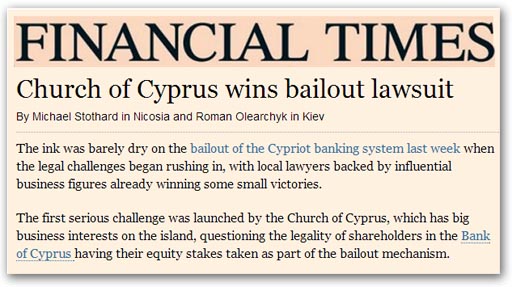It is surprising, therefore, that more has not been made of the Financial Times report which claims that the Church has successfully petitioned for an interim injunction, blocking the expropriation of its funds.
Echoing the Bank of Cyprus statement, a local lawyer is saying that, "The expropriation of property is contrary to the constitution of Cyprus and the European Declaration of Human Rights", on which grounds the injunction was sought.
The case must now go for a full hearing, for the injunction to be confirmed, but it may be resolved by other means. However, the FT says that similar attempts at legal action are expected from companies around the world. Even if unsuccessful, they are set to further muddy the already complex legal situation.
Win or lose, the damage done is considerable, but no more so than to the international reputation of the euro. As a result of the ongoing crisis, Spiegel informs us, countries in the developing world are drastically reducing their euro holdings. They are at their lowest level in a decade.
When the euro was first launched on 1 January 1999, the "colleagues" had ambitions of it rivalling the US dollar as the world's premier reserve currency. And such hopes have now been dashed: developing economies shed some $45 billion worth of euros in 2012 and have sold close to $90 billion-worth since the second quarter of 2011.
But just to remind us that there is nothing new under the sun, Die Zeit reminds us that this is not the first time that a government has made off with its citizens's hard-earned cash.
In Italy, the government Amato raised in summer 1992, with retroactive effect, a tax on all bank deposits. In Britain, the government under Wilson said in 1968 the possession of more than four gold coins - the rest had to be surrendered to the Bank of England.
Norway in 1936, the government raised without warning a special tax on all interest. In the U.S., the Roosevelt administration in 1933 forbade the possession of gold, the precious metal was confiscated and it only paid for about 40 percent of its value.
Quite simply, theft is what governments do, although the devious nature of banking transactions in Cyprus makes it difficult to determine who has been thieving from whom. But, with the Church of Cyprus now in the fray, God may be taking a hand. Things may now get a little more difficult for the Cypriot government.
COMMENT: CYPRUS COMBINED THREAD
